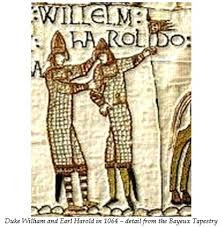In truth, the injection of Norman French vocabulary probably amounted to fewer than 1000 words. They were not random words, however, but words whose presence "reflect[s] the ‘superiority’ of the French culture" to use the words of one scholar. Words like noble, dame, servant, minstrel come from French, as do estate, government, duke, madam, sir.
Even outside of the upper classes, the Norman French words introduced in England are still with us in all walks of life and careers.
Thanks to the Norman influence, we gave ecclesiastical terms clergy, friar, prayer, and the word religion itself! In the legal profession, court, crime, judge and justice are used daily. The military still uses general, sergeant, army, regiment, and siege. A pupil can go to an art lesson and sit in a chair to learn about color or ornament.
True, some of the words came through French ultimately from Latin, but we cannot know that English would have ultimately gained them otherwise. Or would they? There were two major French dialects that influenced English at different times; there was a second influx of Central French vocabulary in the 13th century, further adding to—and maybe confusing?— the English language.
For instance, Latin caballus (horse), led to Norman French cavalier, but Central French chevalier, which is why in Modern English we have not only cavalier and chevalier, but also cavalry and chivalry. Latin canalis (channel) turned into Norman French canal and Central French chanel, so now we have both canal and channel.
Another telling set of Anglo-Saxon vs. Norman French terms comes when we look at livestock. Anglo-Saxon peasants (peasant is French, but from the 15th century) raised cattle and pigs, but when those animals become food and are served at a table, they are dined on by Norman masters as beef and pork.
But these were more subtle changes than some deliberate actions taken by the Normans to show superiority. I'll talk about Norman culture tomorrow, and what they did to "show off."

No comments:
Post a Comment
Note: Only a member of this blog may post a comment.